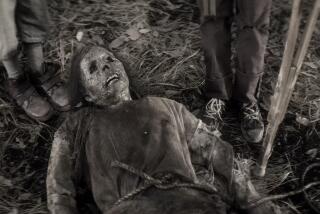Shocking, in a familiar way
- Share via
It’s not often a film should be praised for its lack of originality, but “The Orphanage” is a satisfying horror movie in large part because it is also a veritable compendium of horror-movie conventions. This Spanish-language haunted-house chiller, somewhat lost amid the crush of December award contenders and out on DVD from New Line Home Video this week, has little to do with the teen cut-’em-ups and J-horror rip-offs dominating today’s marketplace.
But first-time director Juan Antonio Bayona borrows heavily -- and smartly -- from the familiar repository of shock tactics and psychological anxieties that have sustained the genre for decades. A primary influence, no surprise, is his producer, “Pan’s Labyrinth” director Guillermo del Toro, whose taste for melancholic ghost stories is readily apparent here.
Laura (Belen Rueda) returns to the orphanage where she spent her early years, accompanied by her husband, Carlos (Fernando Cayo), and their young son, Simon (Roger Princep), hoping to turn the abandoned mansion into a home for disabled children. During a party to welcome the new children, Laura is spooked by the appearance of a boy with a burlap sack on his head, after which Simon promptly vanishes.
Children’s games, with their singsong insinuations and undercurrents of dread, are a recurring motif. Laura is seen as a girl playing a game of statues, which she must later re-create under much creepier circumstances. Simon is led on an elaborate treasure hunt by the group of imaginary friends he acquires soon after moving in. And the moment he disappears, “The Orphanage” itself basically turns into one long, suspenseful game of hide-and-seek.
“The Orphanage” skillfully taps into our most primal anxieties surrounding children -- our fear of them as well as our fear of losing them.
The main source texts are J.M. Barrie’s “Peter Pan,” with its band of lost boys and Neverland as metaphor for the afterlife, and Henry James’ “The Turn of the Screw,” which more or less invented this particular strain of gothic psychological horror.
The James novella, of course, is ground zero for countless films premised on the special relationship between children and the dead, among them Jack Clayton’s 1961 adaptation with Deborah Kerr, “The Innocents”; M. Night Shyamalan’s “The Sixth Sense” (1999); and Spanish director Alejandro Amenabar’s “The Others” (2001), starring Nicole Kidman.
Power of a performance
If “The Orphanage” never winds up in the realm of pastiche -- there are moments that call to mind “The Shining” and “Don’t Look Now,” just to name two more obvious precursors -- it’s thanks largely to Rueda’s portrayal of the bereft mother. That “The Orphanage” could be explained in occult or psychological terms -- and winds up equally resonant either way -- is testament to the nuanced, intense performance at its core.
So many ghost stories, with their cycles of haunting and exorcism, are on some level portraits of grief, and Rueda, who played the pro-euthanasia lawyer opposite Javier Bardem’s quadriplegic in Amenabar’s “The Sea Inside,” makes this achingly clear. Amid the slickly engineered scares and the swirl of reference points, she creates a human center of gravity.
More to Read
Only good movies
Get the Indie Focus newsletter, Mark Olsen's weekly guide to the world of cinema.
You may occasionally receive promotional content from the Los Angeles Times.









